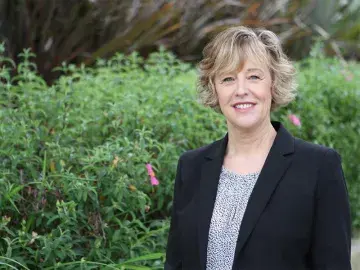Black History Celebration Filled with Energy & Emotion
Former Black Panther Party leader Ericka Huggins has advice for living through these violent, troubled times: talk and listen to one another more, serve as mentors for young people, and meditate every day.
As the featured speaker at Samuel Merritt University’s Black History Month Celebration, Huggins focused on the enduring legacy of slavery and mental health issues in our communities.
“We are the walking-wounded,” said Huggins, an Oakland educator and activist. “Not just African American people, but white people and everyone else who came to this country because it was OK to enslave.”
Huggins spent 14 years in the Black Panther Party, first as the founder of the black liberation group’s New Haven, Connecticut chapter, and later as director of the Oakland Community School. She stood trial alongside Panther chairman Bobby Seale for their alleged roles in the killing of a New Haven member suspected of working with the FBI. Both were acquitted in 1971, though Huggins spent two years in prison before the case went to trial.
Meditating in her prison cell “got me through the most horrendous time of my life,” she said, while she was separated from her infant daughter and spent stretches in solitary confinement.
Huggins led the audience in a brief meditation. “Do this for 20 minutes a day and it will put you in touch with your own power,” she said.
Acknowledging that the Black Panther Party was discredited by the government and the media, Huggins said its history of running free medical clinics and breakfast programs for children endures among today’s community activists.
“The Black Panther Party stood for building a world where all human beings are held sacred,” she said.
Drawing a comparison to the Afrofuturistic hit film “Black Panther,” Huggins encouraged the more than 200 people in attendance to envision building Wakanda, the movie’s fictional African nation that is portrayed as lush and wealthy with no history of colonization or slavery.
“The film has given us the purity and majesty of a small piece of the history of Africa that is lost to our children,” she said.
Held in SMU’s Health Education Center, the Black History Month Celebration was multi-generational.
The Allen Temple Women’s Chorus, dressed in traditional African attire, sang spirituals and led the audience in singing “The Black National Anthem,” also known as “Lift Every Voice and Sing.” HEAT Dance Line, an Oakland troupe of dancers ages 10 to 17, leaped and twirled around the room to a soundtrack mixing “Strange Fruit” — Billie Holiday’s iconic song about American racism — with hip-hop music, ending their high-energy performance with fists raised in the air.
Inspired by the performance, Huggins opened up the conversation to other voices. She invited audience members, particularly young people, to suggest ways of creating a better future. One by one, people took to the microphone to speak.
One SMU nursing student, through tears, read a poem she wrote about racism. Another student from Uganda also cried as she told Huggins how she feels left out of learning about the African-American experience by people she meets who push her away because of her foreign accent.
“This is how deep the wounds go,” Huggins said. “We are taught to hate our skin, our hair, our eyes…then we are expected to be good citizens. It’s insanity.”
When a member of Oakland Lives Matter talked about her work on behalf of mothers who have lost children to gun violence, Huggins encouraged people to offer their help.
“We are all blessed that this woman is still around as a living revolutionary,” Angel Lewis, a lawyer who does diversity work in the tech industry, said of Huggins. “This has been the best Black History Month of my life and this event capped it off.”
During the celebration, SMU President Sharon Diaz was praised for her longtime support of low-income students, the University’s healthcare outreach to community groups, and the creation of the SMU Office of Diversity and Inclusion.
“Sharon has been a champion for justice, diversity and inclusion,” said Margrette Peterson, the chair of the event committee. “She lives by the belief that all people are equal.”
Also during the event, SMU Nursing Instructor Cynthia Stacy, MSN, received the annual Dr. Cornelius Hopper Diversity Excellence Award. Stacy was nominated by her students for serving as a role model and for teaching them about why certain races and ethnicities are at higher risks for certain diseases.
In accepting the award, Stacy recounted a time when a dean told her and a handful of other black and Hispanic students enrolled in her nursing school that they should consider other careers despite the fact that they were all earning passing grades.
“My goal as I wake up each day is that no other student has to experience what I experienced,” said Stacy, sharing her conviction that “You stood on someone’s shoulders and someone will stand on yours.”
Huggins agreed. “If everyone over 25 would mentor somebody, we would save lives,” she said.


